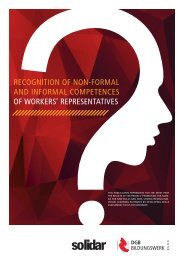The Albanian Fason Industry - Solidar
The Albanian Fason Industry - Solidar
The Albanian Fason Industry - Solidar
You also want an ePaper? Increase the reach of your titles
YUMPU automatically turns print PDFs into web optimized ePapers that Google loves.
• In addition, the Council of Ministers should<br />
issue, as soon as possible, by-laws<br />
regulating the implementation of the law on<br />
state inspectorates and the law on safety<br />
and health at work.<br />
• Finally, the <strong>Albanian</strong> government should<br />
support the aggregation of data by age and<br />
sex in order to calculate the gender pay gap,<br />
thereby better capturing various gender<br />
dimensions of the <strong>Albanian</strong> labour market.<br />
To this end, a database needs to be created<br />
by the National Institute of Statistics<br />
(INSTAT) which would help identify factors<br />
causing this gap and better formulate<br />
policies for preventing this type of<br />
discrimination. Moreover, the government<br />
should improve the information system for<br />
dissemination of official statistics as regular<br />
updates could be an important instrument<br />
for improving labour market deficits.<br />
Recommendations to the European Union<br />
tanks and social partners that would monitor<br />
the application of international policies.<br />
• Furthermore, the EU should provide more<br />
technical and financial assistance to support<br />
the implementation of the Decent Work<br />
Agenda, such as assistance to raise the<br />
capacities of labour inspections.<br />
• In addition, the EU could assist in the<br />
formation of the Social and Economic<br />
Council by helping to share best practices<br />
and experiences from Member States and<br />
push for the establishment of the Labour<br />
Court and special arbitration tribunals.<br />
• In the <strong>Albanian</strong> case, a genuine and<br />
constructive dialogue at the national level<br />
should be supported by the EU as the only<br />
meaningful approach towards bringing<br />
overall progress in the country including the<br />
fulfillment of the Decent Work Agenda.<br />
• <strong>The</strong> future integration of Albania in the<br />
European Union will not be achieved without<br />
compliance with EU social and economic<br />
standards. To achieve this and to fulfill<br />
decent work’s objectives, the EU actors<br />
have to focus continuous attention on<br />
policies that target sustainable economic<br />
development in Albania.<br />
• By implementing the Decent Work Balkan<br />
Network project, for the first time,<br />
experiences as well as expertise were<br />
shared between trade unions and civil<br />
society such as NGOs and think tanks about<br />
the issues in this sector. <strong>The</strong> EU should thus<br />
continue promoting similar socio-economic<br />
partnerships through joint research and<br />
monitoring, cooperation between NGOs and<br />
trade unions, and participation in the social<br />
dialogue.<br />
• In addition, the EU Civil Society Facility<br />
should promote the creation of social<br />
observatories consisting of NGOs, think<br />
15 | Decent Work: <strong>The</strong> <strong>Albanian</strong> <strong>Fason</strong> <strong>Industry</strong>
















